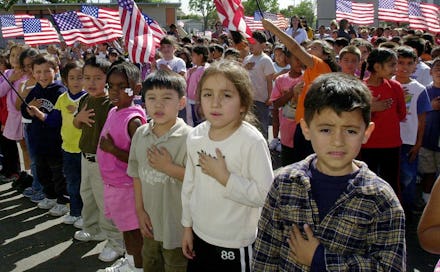Florida Mom Says Son Was Forced to Recite Pledge Of Allegiance Despite Religious Objections

In 1943, amidst the hypernationalism of a world at war, the U.S. Supreme Court ruled that forcing a student to salute or pledge allegiance to the flag was a form of "compulsory unification of opinion," and thus a violation of the First Amendment. Apparently, this 70-year-old ruling was lost on Florida elementary school teacher Anne Daigle-McDonald, who forced a fourth grader to recite the pledge, declaring, "If you can't put your hand on your heart, then you need to move out of the country."
The student, a Jehovah's Witness, was adhering to a religious tradition that equates saluting or bowing to the flag with idolatry. Daigle-McDonald, who has been suspended without pay, denies religious discrimination, but rather voices a concern that "other children might imitate him."
This is not the first time that the Pledge of Allegiance has sparked religious controversy. A case currently before the Massachusetts Supreme Court challenges the constitutionality of the phrase "under God." Though not a part of the original pledge (which, ironically, was penned by a Baptist minister), the phrase was added during the Cold War to emphasize "the dedication of our nation and our people to the Almighty."
The recitation of the Pledge of Allegiance has proved distasteful to religious and secular people alike, and politicians on both sides of the aisle have questioned its utility. In a 2003 article from the Cato Institute, a libertarian think tank, the author describes the pledge as "designed by an avowed socialist to encourage greater regimentation of society."
It is extreme, but this position raises questions as to why schools expect students to declare loyalty to their country on a daily basis. Furthermore, parents and school boards must ask themselves whether this ritual unfairly singles out those from secular backgrounds or different religious traditions. While students are ostensibly not required to say the pledge, indirect pressure from their peers — or, direct pressure from their teachers — may cause children to compromise their beliefs, a de facto violation of the First Amendment.